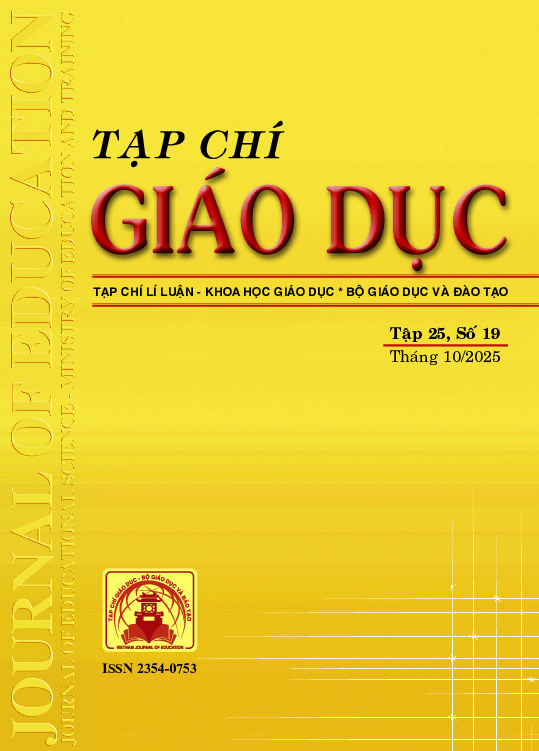Xây dựng khung năng lực giao tiếp và hợp tác thuộc khung năng lực số của học sinh tiểu học trong dạy học Tin học
Tóm tắt
Communication and collaboration competence is a core component of the digital competence framework for learners in the context of digital transformation in education. However, for primary school students - particularly regarding the subject of Informatics, this competence has not yet been clearly defined in terms of structural components and behavioral indicators. This study employed the Delphi method with the participation of 32 experts in the first round and 27 experts in the second round to develop a framework of communication and collaboration competence specifically for primary students in Informatics education. The research identified six competence components and eighteen specific indicators, all of which were validated for reliability and relevance by the expert panels. The findings contribute to enhancing the theoretical foundation of communication and collaboration competence in the digital education context and provide a practical basis for designing assessment tools and proposing appropriate pedagogical strategies to foster this competence among primary school students.
Tài liệu tham khảo
Bộ GD-ĐT (2025). Thông tư số 02/2025/TT-BGDĐT ngày 24/01/2025 quy định Khung năng lực số cho người học.
Carretero Gomez, S., V. R., & Punie, Y. (2017). DigComp 2.1: The Digital Competence Framework for Citizens with eight proficiency levels and examples of use. Publications Office of the European Union.
Chu, H., & Hwang, G. (2008). A Delphi-based approach to developing expert systems with the cooperation of multiple experts. Expert Systems with Applications, 34(4), 2826-2840.
Franklin, K. K., & Hart, J. K. (2006). Idea Generation and Exploration: Benefits and Limitations of the Policy Delphi Research Method. Innovative Higher Education, 31(4), 237-246. https://doi.org/10.1007/s10755-006-9022-8
Lê Anh Vinh, Bùi Diệu Quỳnh, Đỗ Đức Lân, Đào Thái Lai, Tạ Ngọc Trí (2021). Xây dựng khung năng lực số cho học sinh phổ thông Việt Nam. Tạp chí Khoa học Giáo dục Việt Nam, số đặc biệt tháng 1, 1-11.
Linstone, H. A., & Turoff, M. (1975). The Delphi Method: Techniques and Applications. Addison-Wesley.
Nguyễn Hồng Dương, Tạ Thanh Trung, Lê Thị Thúy An, Trương Đình Trung (2025). Định hướng dạy học tăng cường năng lực giao tiếp và hợp tác thuộc khung năng lực số của học sinh tiểu học. Tạp chí Khoa học và Công nghệ, Đại học Thái Nguyên, 230(04), 145-153. https://doi.org/10.34238/tnu-jst.11729
Sarbadhikari, S. (2020). The Future of Communication in a Digital World. In Effective Medical Communication (pp. 187-195). Springer Singapore. https://doi.org/10.1007/978-981-15-3409-6_18
Trịnh Thị Phương Thảo, Trịnh Thanh Hải, Lê Minh Cường, Đỗ Bảo Châu, Trần Trung (2024). Năng lực số của học sinh trung học phổ thông ở Việt Nam. Tạp chí Giáo dục, 24(6), 6-11.
Vuorikari, R., Kluzer, S., & Punie, Y. (2022). DigComp 2.2: The Digital Competence Framework for Citizens - With new examples of knowledge, skills and attitudes. Publications Office of the European Union. https://doi.org/10.2760/115376
(online), 10.2760/490274 (print).
Tải xuống
Đã Xuất bản
Cách trích dẫn
Số
Chuyên mục
Giấy phép

Tác phẩm này được cấp phép theo Ghi nhận tác giả của Creative Commons Giấy phép quốc tế 4.0 .












